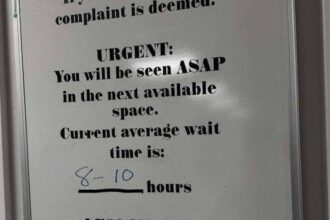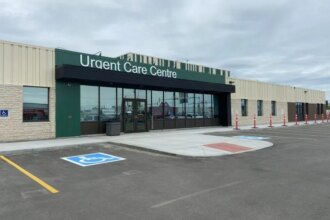In the shadows of Kelowna General Hospital’s gleaming facilities lies a troubling reality that local MLAs are no longer willing to ignore: a fundamental breakdown in healthcare accountability that’s leaving patients vulnerable and healthcare workers overwhelmed.
“There’s a crisis of accountability happening right before our eyes,” said Harwinder Sandhu, NDP MLA for Vernon-Monashee and a registered nurse, during a recent press conference. “When patients can’t access timely care, when families are left wondering why their loved ones fell through the cracks, we need to acknowledge that the system isn’t just strained—it’s failing in its basic obligations.”
The accountability concerns come amid growing reports of extended emergency room wait times, delayed surgeries, and critical staffing shortages throughout the Kelowna health region. According to data obtained through freedom of information requests, patient complaints about care coordination have increased by nearly 37% over the past eighteen months, while resolution timelines have simultaneously lengthened.
Renee Merrifield, BC United MLA for Kelowna-Mission, echoed these concerns from across the political aisle. “This isn’t a partisan issue; it’s a human one,” Merrifield stated. “Healthcare leadership must be transparent about challenges and take meaningful responsibility when systems fail. Currently, we’re seeing too much bureaucratic deflection and not enough actionable solutions.”
The MLAs have jointly called for the establishment of an independent healthcare accountability office for the Interior Health region that would report directly to the provincial legislature rather than through health authority channels. Their proposal includes mandatory quarterly public reporting on key performance metrics, standardized response protocols for serious incidents, and a streamlined complaint resolution process.
Interior Health representatives have acknowledged the concerns but cite unprecedented system pressures, including population growth, healthcare worker burnout, and the lingering effects of the pandemic. “We remain committed to transparency and continuous improvement,” said an Interior Health spokesperson in a written statement, though the response offered few specific remedies for the identified accountability gaps.
Healthcare worker unions have thrown support behind the MLAs’ push for greater accountability measures. “Our members are desperately trying to provide quality care in a system that lacks the necessary checks and balances,” noted a BC Nurses’ Union representative. “When accountability breaks down, it’s frontline workers who face the impossible task of explaining system failures to patients.”
The accountability crisis extends beyond hospital walls. Community care providers report increasing difficulties in coordinating with hospital teams during patient transitions, creating dangerous gaps in continuity of care. Family physicians express frustration with their inability to track referrals or advocate effectively for patients lost in the system.
For patients like Kelowna resident Margaret Chen, who waited 17 hours in the emergency department before receiving care for what turned out to be a serious infection, the accountability conversation is long overdue. “Nobody could tell me why I was waiting so long or who was responsible for ensuring I received timely care,” Chen recalled. “It felt like I’d entered a system where responsibility was constantly being passed around, but never actually accepted.”
As Interior Health faces mounting pressure to address these concerns, the broader question emerges: in our increasingly complex healthcare system, has the fundamental covenant between care providers and patients—one built on responsibility and trust—begun to unravel? And if accountability cannot be restored, what hope remains for rebuilding public confidence in a system meant to heal, not harm?























